Initiatives and Challenges
- EIT Crisis Response Initiative:
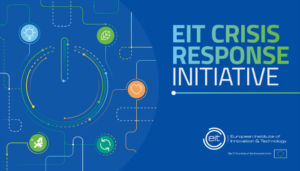 As part of the EU’s collective efforts to tackle the COVID-19 crisis, the European Institute of Innovation & Technology (EIIT) has mobilised a 60 million EUR Crisis Response Initiative to fund innovators powering high-impact solutions that tackle this unprecedented social and economic challenge. The financing will allow the launch of new innovation projects to address the immediate crisis as part of the ‘Pandemic Response Projects’, and will support highly innovative start-ups, scale-ups and SMEs crucial to the economy’s fast recovery to benefit from additional funding under the ‘Venture Support Instrument’.
As part of the EU’s collective efforts to tackle the COVID-19 crisis, the European Institute of Innovation & Technology (EIIT) has mobilised a 60 million EUR Crisis Response Initiative to fund innovators powering high-impact solutions that tackle this unprecedented social and economic challenge. The financing will allow the launch of new innovation projects to address the immediate crisis as part of the ‘Pandemic Response Projects’, and will support highly innovative start-ups, scale-ups and SMEs crucial to the economy’s fast recovery to benefit from additional funding under the ‘Venture Support Instrument’.
- The EUR 60 million financing will power innovations in health, climate change, digitisation, food, sustainable energy, urban mobility, manufacturing and raw materials.
- Here is the link to the ongoing EIC funding calls!
- This call is open to European food & Agri startups and scaleups (based in a Member State of the EU or Horizon2020-associated country).
- The EIT Health community is working tirelessly in responding to the pandemic, harnessing their combined knowledge and the strength of their network to join the fight against the virus. Find out about their latest examples of innovative solutions being developed and rolled out across the EIT Health network.EIT Health has also launched a new ‘matchmaking’ solution that allows innovators working in COVID-19-related research, product development, or frontline healthcare to share their on the ground needs and solutions.
- ESCMID Emerging Infections Task Force (EITaF) and the German Infectious Disease Society initiated the Lean European Open Survey on SARS-CoV‑2 (LEOSS) project, a prospective European multi-center cohort study, to get more in-depth knowledge about the epidemiology and clinical course of patients infected with SARS-CoV‑2.
LEOSS’ goal is to establish a quick and simple register that allows anonymous documentation of patients. This data can be used to identify independent predictors of outcome in patients with diagnosed infection by SARS-CoV‑2.
- European Union has launched COVID-19 initiatives such as the Joint Procurement Agreement for purchasing personal protective equipment, respiratory ventilators and items necessary for coronavirus testing and the rescEU stockpile of supplies needed to fight the coronavirus.
- EU-India Incubator Network has put together a list list of online platforms and online events/hackathons from European and Indian innovators collaborating to address the challenges associated with COVID-19:
- Indigram Labs Foundation is calling for startups working on finding the solution to COVID related problems in rural India. They have launched a call for applications, COVID Mukt Gram. Deadline is 31st May 2020.
-
- Global – MIT Solve
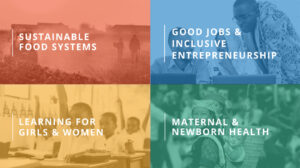 is seeking tech innovations that can slow and track the spread of an emerging outbreak. If you have a solution you can apply and get the support of US$1 million in prize funding and nine months of personalized support through the Solver program. Deadline is on 18th June 2020.
is seeking tech innovations that can slow and track the spread of an emerging outbreak. If you have a solution you can apply and get the support of US$1 million in prize funding and nine months of personalized support through the Solver program. Deadline is on 18th June 2020.
- Call for Code: has launched a 2020 Call for Code Global Challenge that has expanded to tackle on COVID-19 in addition to climate change. Innovators and problem solvers are asked submit solutions by July 31, 2020. Call for Code is asking Innovators to create practical, effective and high quality based on one or more IBM cloud services to build solutions to mitigate the impact of the COVID-19 and climate change.
- Grand prize winner – $200,000 USD
- First and second – $25,000 USD
- Third and fourth – $10,000 USD
- IEEE Circuits and Systems Society (CASS), aims to support young startups trying to create technology solutions aligned with Circuits and Systems Society goals to help in the COVID-19 pandemic. The technologies can be geared (at low-cost for large scale application) for diagnostics, treatment, surveillance, and prevention, targeted for specific communities (such as nursing homes, refugee camps, etc.) The winning teams will be invited to join ISCAS 2020 in Seville (11-14 October 2020) and will win grants of up to US$ 10000. Deadline is 15th July 2020!
- Global – The GHS Challenge Fund would allow funding – for immediate COVID-19 preparation and detection, as well as preparation for future pandemic threats to be disbursed in a transparent and comprehensive way, with resources flowing directly to eligible countries.
- The COVID-19 Detect & Protect Challenge: The UNDP announces the COVID-19 protect and detect challenge in partnership with Hackster.io to create an open source technology that developing countries can leverage in the fight against the pandemic. Join the challenge!
- The Global Hack i
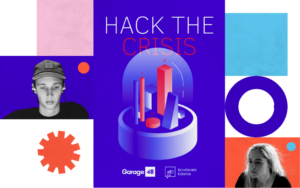 s a global initiative which unites the Hack the Crisis movement and the 40+ hackathons organized in the frames of this movement. The Global Hack happened 9-12 April and was created to battle the problems we are facing globally in the midst of the crisis as well as creating solutions for the post-crisis world.
s a global initiative which unites the Hack the Crisis movement and the 40+ hackathons organized in the frames of this movement. The Global Hack happened 9-12 April and was created to battle the problems we are facing globally in the midst of the crisis as well as creating solutions for the post-crisis world.
See the results HERE.
Browse the articles HERE.
Visit the Global Hack-the-Crisis Community website HERE. - The Startups vs COVID 19 initiative, is an online platform and all efforts taken by investors, government departments, and stakeholders in the startup ecosystem are consolidated to support Indian startups tackling COVID 19.
- The NEED4HEALTH online platform is where healthcare professionals can list their needs in regards to COVID-19, and companies can post solutions that can have a positive impact to the current crisis and post crisis.
- SINE ITT Bombay is implementing a “Centre for Augmenting WAR with COVID-19 Health Crisis” (CAWACH) on behalf of the Indian Government’s Department of Science and Technology to scout, evaluate and support the innovations and start-ups that address COVID-19 challenges.
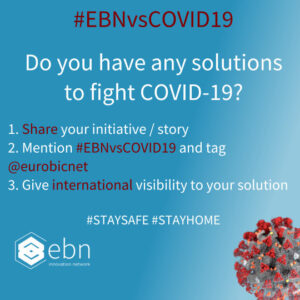
- #EBNvsCOVID 19 is an initiative launched by EBN to tackle the COVID-19 crisis. EBN members and the companies they support are being asked to pitch their initiatives and innovative solutions.
- EUvsVirus Challenge is a Hackathon that the European Commission hosted from April 24th – 26th, to connect innovators across Europe to develop innovative solutions to overcome coronavirus-related challenges.
- Global – MIT Solve
- The Interreg Baltic Sea Region has been supporting several initiatives which trigger the exchange of good practices across borders to improve various aspects of the health care systems in the Baltic Sea region. They could be of help to local and regional authorities when overcoming short and long-term consequences of the current crisis.
- EuropaBio – the European Association for Bioindustries shares the news about the activities of EuropaBio and its members in response to the COVID-19 pandemic and also gives a thorough overview of funding opportunities for research & innovation in the fight against COVID-19.
- In cooperation with the EU Commission, the
 Enterprise Europe Network (EEN) has set up the virtual brokerage platform “Care & Industry together against CORONA”. The platform functions as a continuous brokerage platform through which virtual, bilateral talks can be arranged.
Enterprise Europe Network (EEN) has set up the virtual brokerage platform “Care & Industry together against CORONA”. The platform functions as a continuous brokerage platform through which virtual, bilateral talks can be arranged.
- The International Emergency Management Society (TIEMS) asked the experts in their global network if they could contribute with facts and findings concerning the spread of the virus in their countries/regions, which could add valuable information to share: What is the present situation? What counteractions have been established and the results of these, and recommendation to others what could be the best strategy to fight this pandemic. The resulting newsletter can be found HERE.
- Center for Systems Science and Engineering (CSSE) at Johns Hopkins University (JHU)
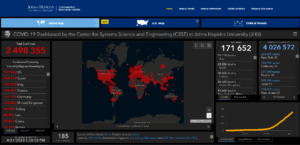 has launched a map depicting coronavirus COVID-19 global cases. Map was developed to pr ovide researchers, public health authorities, and the general public with a user-friendly tool to track the outbreak as it unfolds. The map is maintained in near real time throughout the day through a combination of manual and automated updating.
has launched a map depicting coronavirus COVID-19 global cases. Map was developed to pr ovide researchers, public health authorities, and the general public with a user-friendly tool to track the outbreak as it unfolds. The map is maintained in near real time throughout the day through a combination of manual and automated updating.
- European Cluster Collaboration Platform (ECCP) has created a
 Covid-19 Industrial Clusters Response Portal that supports the efforts of industrial clusters to address the challenges posed by the COVID-19 epidemic in Europe. This webpage has been created to facilitate the interaction of the industrial cluster community to allow fast and direct responses within the community itself too. Its objective is twofold:
Covid-19 Industrial Clusters Response Portal that supports the efforts of industrial clusters to address the challenges posed by the COVID-19 epidemic in Europe. This webpage has been created to facilitate the interaction of the industrial cluster community to allow fast and direct responses within the community itself too. Its objective is twofold:
- Serve as a one-stop shop where reliable information can be found on actions and decisions of the European Commission for industry and especially industrial clusters.
- Support an open discussion forum where actors can share their experiences, solutions, requests and questions.
Articles
- Highlights from 40 COVID-19 Research Papers Published in August 2020.
Colangelo, M. (2020, September 4). Highlights from 40 COVID-19 Research Papers Published in August 2020. Deeptech Weekly Newsletter. Retrieved from https://bit.ly/3h86kB6 - Sweden will adjust a key corner of its strategy for dealing with Covid-19, after the death rate at care homes spiraled out of control.
Daly, C. & Wienberg, C. (2020, May 20). Sweden Adjusts Controversial Covid Plan After Care Homes Crisis. Bloomberg. Retrieved from https://bloom.bg/36u8Az5 - Swiss Propaganda Research has published a page with fully referenced facts about Covid-19, provided by experts in the field, to help the readers make a realistic risk assessment. News and facts on medical and political developments are regularly updated.
- An overview of how the University of Tartu researchers help to solve the global coronavirus pandemic. On the website, you will find references to studies on coronavirus and the impact of the emergency situation carried out by UT researchers and their related comments published in media.
- The available evidence suggests that many covid-19 victims were far from death’s door previously, and cut down at least a decade before their time. Allowing the virus to spread freely would sacrifice the strong as well as the weak.
The Economist. (2020, May 2). Would most covid-19 victims have died soon, without the virus? The Economist Group Limited. Retrieved from https://econ.st/2Sy9R2d - A vaccine would be the ultimate weapon against the coronavirus and the best route back to normal life. Officials like Dr. Anthony S. Fauci, the top infectious disease expert on the Trump administration’s coronavirus task force, estimate a vaccine could arrive in at least 12 to 18 months.
Thompson, S. A. (2020, April 30). How Long Will a Vaccine Really Take? The New York Times. Retrieved from https://nyti.ms/2z3OAXg - The scientific community must take up cudgels in the battle against bunk.
Caulfield, T. (2020, April 27). Pseudoscience and COVID-19 — we’ve had enough already. Nature Research. Retrieved from: https://www.nature.com/articles/d41586-020-01266-z?fbclid=IwAR0iw-9OyGW-7tdmdZTfJxxcf1NlPD9YjiB-XmAKeX0WtVUfmuGgYc5U8Kw - Antibody tests have captured the world’s attention for their potential to help life return to normal by revealing who has been exposed, and might now be immune, to the new coronavirus. But as with most new technologies, there are signs that the promises of COVID-19 antibody tests have been oversold, and their challenges underestimated.
Mallapaty, S. (2020, April 18). Will antibody tests for the coronavirus really change everything? Springer Nature. Retrieved from https://www.nature.com/articles/d41586-020-01115-z - In March, 2020, Moderna became the first company to test a COVID-19 vaccine in humans, and, now, the Biomedical Advanced Research and Development Authority (BARDA) is stepping up to pay its way to approval. The agency is committing up to $483 million to bankroll late-stage clinical trials and scale up manufacturing for the vaccine.
Business Wire. (2020, April 16). Moderna Announces Award from U.S. Government Agency BARDA for up to $483 Million to Accelerate Development of mRNA Vaccine (mRNA-1273) Against Novel Coronavirus. Business Wire. Retrieved from https://www.businesswire.com/news/home/20200416005985/en/ - AS COVID-19 has spread around the world, people have become grimly familiar with the death tolls that their governments publish each day. These numbers give a better indication of a country’s trajectory than do counts of confirmed cases, which largely measure how many people have been tested.
The Economist (2020, April 16). Tracking covid-19 excess deaths across countries. The Economist. Retrieved from https://econ.st/2KsMmTR - The FDA has granted an emergency authorization to a blood purification system to treat patients with the most severe cases of COVID-19.
Hale, C. (2020, April 10). FDA greenlights blood detox device to combat COVID-19’s cytokine storms. Fierce Biotech. Retrieved from https://bit.ly/2RXjAyJ - Belgian company Zentech has set-up a serologic test to diagnose the immune response against COVID19. Read the press articles about the discoveries (articles are in French).
Thunus, O. (2020, April 09). Le test Covid-19 des Liégeois de ZenTech a prouvé son efficacité. Rtbf.de. Retrieved from https://www.rtbf.be/info/regions/liege/detail_le-test-covid-19-des-liegeois-de-zentech-a-prouve-son-efficacite?id=10478960 - AstraZeneca has outlined its multipronged approach to the development of antibodies against the pandemic SARS-CoV-2 virus. The Big Pharma is applying its own discovery capabilities to the task and helping evaluate candidates identified by academic partners in China and the U.S.
Taylor, N.P. (2020, April 08). NAstraZeneca targets summer start for COVID-19 antibody trial. Fierce Biotech. Retrieved from https://bit.ly/3csNOBA - The world needs mass at-home serological testing for antibodies elicited by SARS-CoV-2, and rapid and frequent point-of-care testing for the presence of the virus’ RNA in selected populations.
Nature Biomedical Engineering. (2020, April 08). Humanity tested. Nat Biomed Eng. Retrieved from https://doi.org/10.1038/s41551-020-0553-6 - Novartis and Incyte will initiate a phase 3 clinical trial for Jakafi––marketed as Jakavi abroad––to test it as a treatment for cytokine storm, an immune overreaction that causes respiratory complications in severe COVID-19 patients.
Novartis International AG. (2020, April 02). Novartis announces plan to initiate clinical study of Jakavi® in severe COVID-19 patients and establish international compassionate use program. GlobeNewswire. Retrieved from https://bit.ly/2VPGVU4 - As the coronavirus (COVID-19) causes widespread impacts to communities and businesses across the world, several Swedish life science companies have stepped up and shifted production to meet demand for solutions that can help fight the virus.
Investingothenburg.com. (2020, April 01). Corona pandemic: Companies adapt production to support the needs of health care. Investingothenburg.com. Retrieved from http://www.investingothenburg.com/news/corona-pandemic-companies-adapt-production-support-needs-health-care - Analysis of regional disparities in incidence has revealed that a sharp decline in influenza epidemics is a useful surrogate indicator for the undocumented spread of SARS-CoV-2. The biggest concern in the world is knowing when herd immunity has been achieved and scheduling a time to regain the living activities of each country. This study provides a useful tool to guide the development of local policies to contain the virus.











